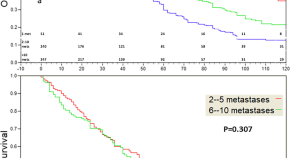CT based intratumor and peritumoral radiomics for differentiating complete from incomplete capsular characteristics of parotid pleomorphic adenoma: a two-center study
Authors (first, second and last of 11)

Collection
The curation of this topical collection is motivated by the growing number of articles published in literature on AI & Medicine and the challenges discussed therein. It is hoped that its contents will illuminate the existing issues in the current AI applications in oncology and advance demystifying investigations that will ultimately translate to real-world clinical use.
Topics of Interest: The scope of the collection will cover but not be limited to:
- Artificial Intelligence in clinical oncology, including screening, detection, diagnosis, prognosis, and intervention of cancer
- AI in anti-cancer drug discovery and development
- AI in cancer biomarker discovery
- AI in cancer research
- AI in cancer imaging and digital pathology
- AI in cancer prevention and control
- AI-enabled precision medicine
- AI in personalized cancer care
- Big data and multi-omics data analytics in oncology
- Blockchain technology in oncology
- Medical image generation to facilitate deep learning
- Uses of immersive (VR, AR, MR and ER) technologies in oncology
Keywords: Artificial Intelligence in oncology; immersive technologies in oncology; big data and multi-omics analytics in oncology; detection, prognosis, diagnosis and treatment of cancer; drug and biomarker discovery in cancer
Prof. Shen Yin, Norwegian University of Science and Technology, Norway He received the M.Sc. degree in control and information system and the Ph.D. degree in electrical engineering and information technology, University of Duisburg-Essen, Germany, in 2007 and 2012, respectively. He is currently a DNV-GL Professor with the Department of Mechanical and Industrial Engineering, Norwegian University of Science and Technology. His research interests include safety, reliability of complicated systems, system and control theory, data-driven and machine learning approaches, and applications in human health diagnosis.
Prof. Hai Li, Institute of Health and Medical Technology, Hefei Institutes of Physical Science, Chinese Academy of Sciences (CAS), China He received the B.E. M.E. and Ph.D. degrees from Northwestern Polytechnical University (NWPU) and completed his postdoctoral fellowship at The Methodist Hospital Research Institute (TMHRI), Weill Cornell Medical College of Cornell University. Dr. Li's main research interests are in the development of computational methods and models for 3D biomedical image (MRI, DT-MRI, fMRI, CT) analysis, as well as its applications in clinical diagnosis and follow-up studies of all kinds of diseases.
Prof. Jianting Sheng, Houston Methodist Hospital and Weill Cornell Medicine, USA He is an Assistant Professor of Computational Biology and Mathematics in Oncology at Houston Methodist and Weill Cornell Medicine. He received his BSc and PhD in Mathematics from Shandong University and completed his postdoctoral fellowship in cancer systems biology at Houston Methodist Research Institute, Houston, USA. His research interests are in systems biology, bioinformatics, and computational biology and their applications in drug discovery and repositioning.
Prof. Stephen T. C. Wong, Houston Methodist Hospital &Weill Cornell Medicine, USA He is the John S. Dunn Presidential Distinguished Chair, Founding Chair of Systems Medicine and Bioengineering Department, Director of the Chao Center for BRAIN and Translational Photonics Laboratory, and Associate Director of Cancer Center, Houston Methodist Hospital, Texas. He is a Professor of Radiology, Neuroscience, Pathology and Laboratory Medicine of Cornell University. Previously, he was a Professor at UCSF and Harvard University. Stephen has served in executive roles in major tech companies including HP, Bell Labs, and Philips Healthcare.



